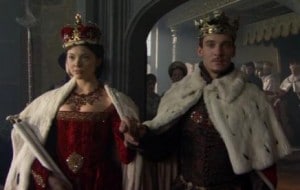 On this day in history, 1st September 1532, Henry VIII made Anne Boleyn Marquis (Marchioness or Marquess) of Pembroke.
On this day in history, 1st September 1532, Henry VIII made Anne Boleyn Marquis (Marchioness or Marquess) of Pembroke.
Why did Henry give Anne such a prestigious title in her own right? Quite simply it was to “fit” her for the European stage, in readiness for meeting King Francis I of France. “The Great Matter” was still not resolved and Anne was not yet Henry’s wife and Queen, so she required some status befitting of England’s future Queen.
Eric Ives1 writes of how, on Sunday 1st September 1532, Anne dressed in jewels and ermine trimmed velvet for the lavish ceremony at Windsor Castle. She must have looked a queen with her loose flowing hair (traditional for coronations), beautiful clothing and jewels, and that is what Henry and Anne wanted to show. Anne was England’s Queen in all but name.
At the ceremony, Anne, accompanied by her cousin Mary Howard, the Countess of Derby and the Countess of Rutland, was taken into Henry VIII’s presence by the Garter King-at-arms, and knelt in front of the King and the Dukes of Norfolk and Suffolk. There, kneeling, she listened as Stephen Gardiner read out the patent which gave her the title of Marquis of Pembroke in her own right, a title that would also pass on to her offspring. After this patent was read, the King crowned her with the gold coronet of a marquis and placed on her a crimson velvet mantle. Anne received not only the patent but also her own lands which were worth over £1000 per year.
The lavish ceremony was followed by a sumptuous banquet as Henry and Anne celebrated Anne’s noble title. She would be Queen in just a few months.
There is a record of the ceremony in Letters and Papers, Foreign and Domestic, Henry VIII:-
” ‘Creacion of lady Anne, doughter to therle of Wilteshier, marquesse of Penbroke.’
Sunday, 1 Sept. 1532, 24 Hen. VIII. The lady was conveyed by noblemen and the officers of arms at Windsor Castle to the King, who was accompanied by the dukes of Norfolk and Suffolk and other noblemen, and the ambassador of France. Mr. Garter bore her patent of creation; and lady Mary, daughter to the duke of Norfolk, her mantle of crimson velvet, furred with ermines, and a coronet. The lady Marques, who was “in her hair,” and dressed in a surcoat of crimson velvet, furred with ermines, with strait sleeves, was led by Elizabeth countess of Rutland, and Dorothy countess of Sussex. While she kneeled before the King, Garter delivered her patent, which was read by the bishop of Winchester. The King invested her with the mantle and coronet, and gave her two patents,—one of her creation, the other of 1,000l. a year. She thanked the King, and returned to her chamber.
Gifts given by the lady Marques :—To Mr. Garter, for her apparel, 8l.; to the Office of Arms, 11l. 13s. 4d. The King gave them 5l.
Officers of Arms present :—Garter and Clarencieux, kings; Richmond, Carlisle, and Windsor, heralds; Rougecross, Portcullis, Bluemantle, and Guisnes, pursuivants.”2
and also a record of the valuation of Anne’s lands:-
“Valuation of her lands.
Total of the lands of the lady Anne marchioness in Wales, over and above casualties not charged, 710l. 7s. 10¾d., out of which she is charged to pay by the King’s grants yearly, 199l. 5s. 11d., “which the tallage or knowledge money will discharge for the time; and after that, the fines for the sessions and the customs which be not charged in the value will discharge them.”
Sum of the lands in England : Corry Mallett, Soms., Hundesdon, and Estwyke, Herts, “lands late Philip Pary’s, in Hundesdon,” manors of Stansted, Roydon, Fylollyshall, and Cokkeshall, and Weston next Baldoke (value of each stated separately), 313l. 5s. 3¾d. Total for England and Wales by the last gift of the King, 1,023l. 13s. 2¾d.”3
Click here to read Esther Hyams’ wonderful poem “The Lady Marquess” about this important day for Anne Boleyn.
Notes and Sources
- “The Life and Death of Anne Boleyn”, Eric Ives, pp158-159
- L&P, v.1274
- Ibid.